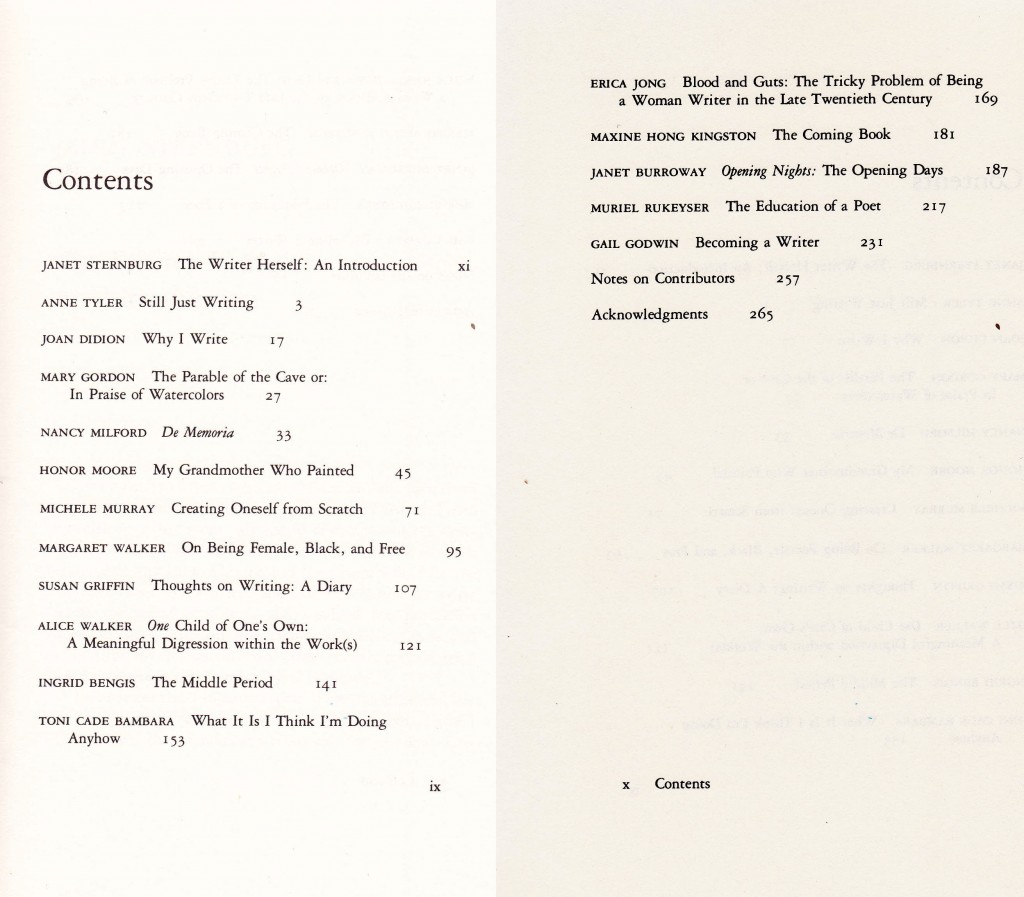I have a new project on the burners – editing an anthology on the experience, process, and craft of writing from a position of diversity or marginalization.
The model/inspiration is Janet Sternberg’s The Writer on Her Work, a collection of essays by women writers about their writing. What I’m looking for are essays that talk about how being marginalized informs a person’s writing. The essays would have a strong autobiographical and experiential component; this is storytelling, not analysis. In the Sternberg book, writers talk about their experiences with discrimination, motherhood, their families, the letters they get from readers, childhood incidents that influenced their decisions to be writers. And I want essays about craft, about writerliness, about finding the writers to read that one wants to be. (If you’re transgendered, where are your models? What’s it like to have no models? If you’re black, do you feel inhibited by the category “Black writers”? etc.) I’d like the anthology to be a positive resource and inspiration for other writers, a description of the challenges of writing when outside the dominant culture, and an offering of a path through those challenges or a recognition of community. Ideally the contributors would be able to able to read each other’s essays and engage in a bit of dialogue with each other as well.
Below is a first rough stab at a proposal that outlines more of the background and content of the imagined anthology. It’s a lot more formal than the anthology itself might be, because that’s the nature of a proposal – this is a general audience book, not a textbook. I’m not looking for contributors yet but if you would like to be included or have suggestions for someone you would like to see, please leave a comment and I will start to build a potential list. Also, if you know of any existing pieces that might fit the bill, I would love to hear about them in order to show prospective publishers some samples. Thanks.
Here’s the Sternberg TOC, as as a sample:
*******
The push for diversity in fiction seemed to reach a critical point in 2014, with the #WeNeedDiverseBooks hashtag and organization, the publicity surrounding Jacqueline Woodson’s winning of the National Book Award, and panels about diversity at different industry events, including the Nebula Awards, the American Library Association Midwinter Meeting, New York Comic Con, and BEA 2014. The Publisher’s Weekly annual salary survey included questions about diversity. In speculative fiction, Lightspeed Magazine put out an issue called Women Destroy Science Fiction, and similar issues followed (Women Destroy Fantasy, Queers Destroy Science Fiction). In early 2015 Crown Books for Young Readers announced that it was putting out an anthology of short stories by diverse authors. Analyzing literature in terms of diversity has moved from academia to the mainstream.
In diversity discussions, talk has centered in basically two camps: how to add diversity to one’s work, and how to get wider representation by diverse authors. What is missing, however, is any formal discussion of writing while diverse. What is it like to be a person of color in a primarily white writing workshop or MFA program? What effect does transitioning genders have on one’s writing? How much background should a writer give when writing about a little-known culture? What about when a writer needs to reject some of his or her culture because cultural limits get in the way of being a better writer?
Many writers discuss these issues on twitter and blogs, talking personally about disabilities, gender issues, religions, sexuality, being a person of color, and so on. The proposed anthology would formalize and collect these discussions in a series of essays by people from variously diverse backgrounds about what it means to write from the margins. In 1980, Janet Sternberg published The Writer on Her Work, an anthology of essays by women writers, and the book remains in print. The proposed anthology would be of a similar model, with essays encompassing the experiential and the autobiographical while also talking about the act of writing.
The anthology’s audience would include writers of all levels who want to hear more about writing craft and process; readers who are interested in diversity; editors and publishers seeking to increase the diversity in what they publish; and writing and literature teachers in high school and college, who could use it as an instructional text in creative writing classrooms or literary seminars.


1 comment
Ciaran Roberts
January 23, 2015 at 3:25 pm (UTC -7) Link to this comment
I might be interesting in contributing. I’m a bisexual woman currently doing an MA in Creative Writing and there has been some interesting adjustments to make talking to other writers regarding character sexuality when they don’t come from a fanfiction background (including being told how brave I am for writing about alternate sexualities).